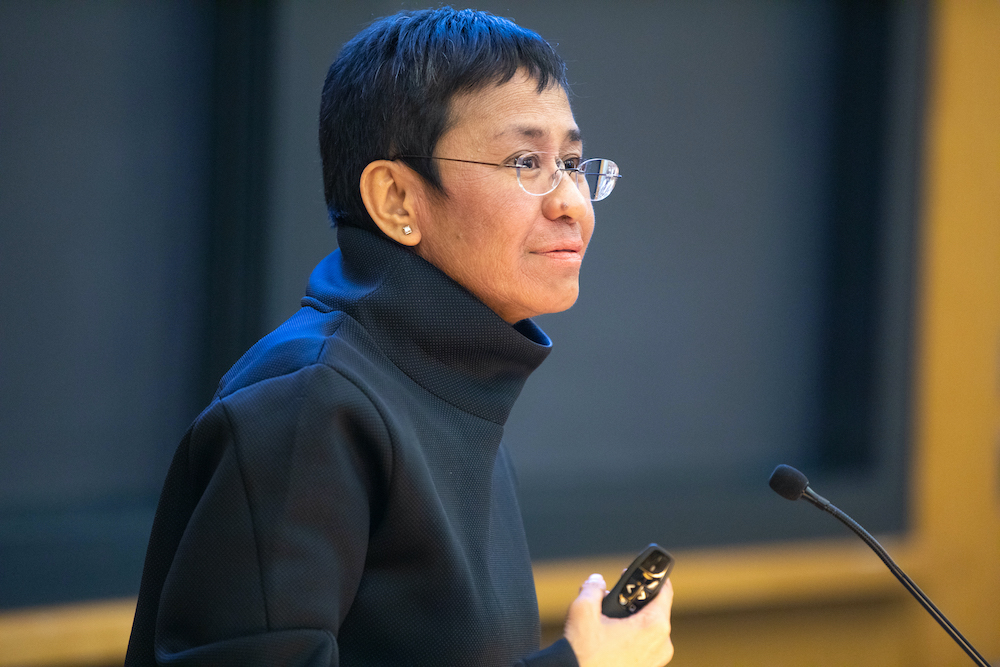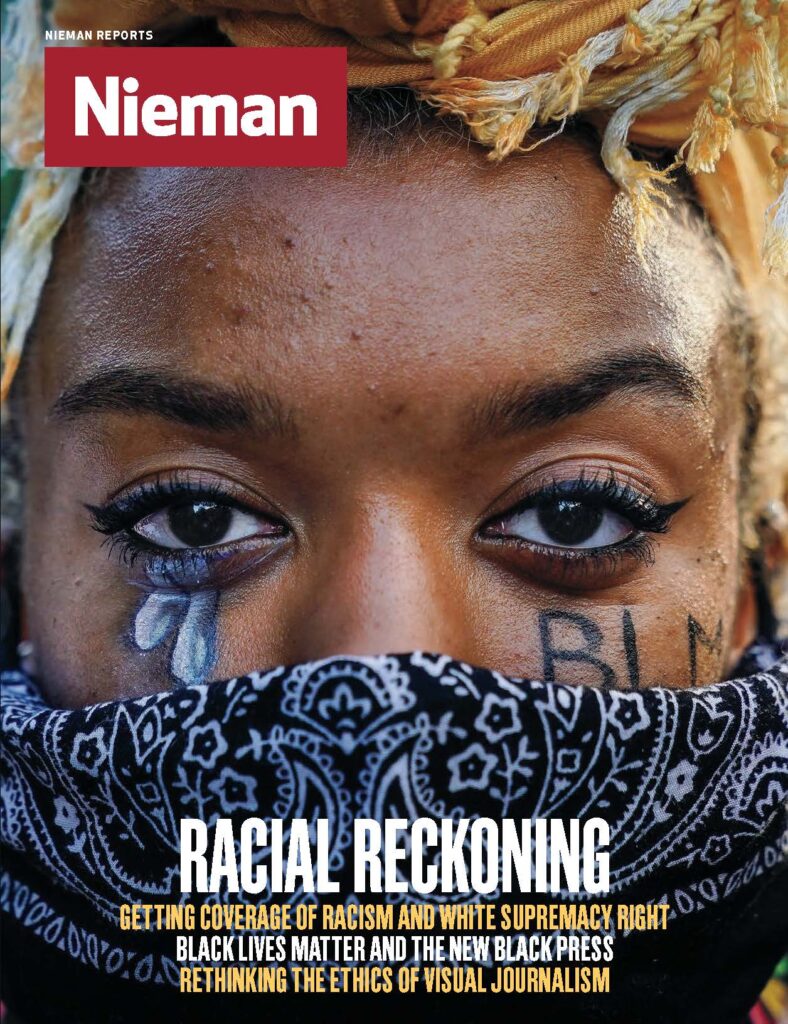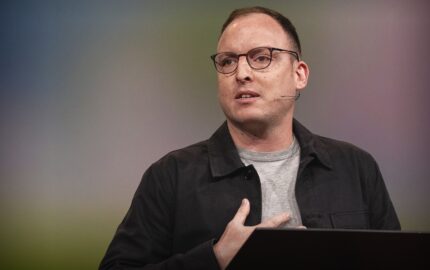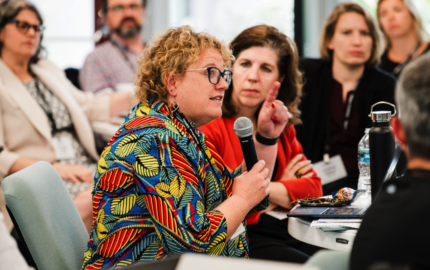The facts of Maria Ressa’s career are impressive enough: Princeton cum laude, Fulbright Fellow, CNN bureau chief in Manila and Jakarta, CNN's chief investigative reporter in Asia, author of two books on terrorism, news division head at ABS-CBN, the Philippines’ largest media and entertainment company, and eight years ago, a founder of Rappler, one of her country's leading digital journalism sites.
In introducing Ressa when she spoke at Harvard in early March, Nieman Foundation curator Ann Marie Lipinski offered this concise history of Ressa’s career in the Philippines and mentioned that she and Ressa are members of Reporters Without Borders’ global Information and Democracy Commission, adding “Rappler's journalism exposing corruption and conflicts in President Duterte's government including Duterte's extrajudicial killing campaigns has attracted not just the enmity of the government but the full force of its retaliatory powers.
There are at least seven cases being tried in court against Rappler, against Ressa, the news site’s CEO and executive editor, against Rappler's directors, against a former researcher. The charges range from tax evasion to cyber libel, all of them expensive and potentially devastating to the publication and to its founder.
Related Reading
In the Philippines, Journalists Confront Fake News and a Crackdown on Press Freedom
By Marites Dañguilan Vitug
“Unite and Resist Every and All Attempts to Silence Us”: Filipino journalists fight back against President Rodrigo Duterte’s attempts to shut down Rappler and other news outlets
By Marites Dañguilan Vitug
She has been arrested twice. Some weeks, she spends as many as four days in court on separate trials, and she faces significant prison time should she be convicted.
Duterte and what are now familiar echoes from other global leaders has repeatedly attacked Ressa and Rappler, and said he desires to ‘Kill journalism in the Philippines.’ ‘Just because you’re a journalist,’ he said, ‘you are not exempted from assassination if you're a son of a bitch.’
In addition to investigating the president and his government, Rappler has exposed the insidious role that Facebook played in promoting disinformation in the Philippines.
“Do not think that this is only a story about Rappler or the Philippines. I think the biggest problem that we face right now is that the beacon of democracy, the one that stood up for both human rights and press freedom, the United States, now is very confused, she says. “What are the values of the United States?”
In including Maria in its 2018 Person of the Year cover, Time magazine wrote that Rappler has turned into a global bellwether for free, accurate information at the vortex of two malign forces — one, the angry populism of an elected president with authoritarian inclinations, the other, social media.
Ressa herself issued a call to journalists during her conversation with Lipinski: “You’ve got to fight the battle early, or you will be too weak to fight it later on. The worst thing you can do is to stand still.”
Edited excerpts:
On the origins of Rappler
Why did we set up Rappler in 2012? Because it was clear something was changing, that we needed to take investigative journalism and combine it with technology to build communities of action. We wanted impact. We knew climate was a huge story. That was the top of our news agenda. Good governance — we were probably the only newsgroup in the Philippines that looked at the Sustainable Development Goals and covered that as an editorial agenda.
That was the idea for Rappler. I went from managing 1,000 journalists to 12 people. It [began out of a] realization that the world had changed, that Filipinos were young [the median age was 23], and we wanted to use the technology to come to them.
We did really well. Within a year and a half, we grew from 12 employees to 75. Back then, I would speak not about press freedom, but about innovation in news, using technology. But you can’t just play a defensive game. Our information ecosystem has already been destroyed. We’ve been poisoned, and now we have to create what the new world is going to look like.
On Rappler’s innovation and the first attack
We were the new kid on the block that everyone hated at the beginning, because we forced all the newsgroups to walk into social media. [At broadcast outlets back then,] they’d be shooting things, and then they would have to take that, run it to the network, ingest it into the system, and then it would be a few hours before their story is up. In the meantime, before Facebook Live, we figured out how to go live, and our story would be up. We were admired and hated, I think, and it helped that I ran the largest newsgroup [before launching Rappler] so even our advertisers came with us.
We weren’t the first news outlet to be attacked. When the largest newspaper, the Philippine Daily Inquirer, was attacked, they buckled within two weeks and said they would sell to a businessman favorable to President Duterte, but that sale hasn’t gone through.
Then, it was the largest television network, ABS‑CBN. President Duterte continuously threatened not to renew their franchise. When I was there, it was a $450 million company.
The case in January 2018 was to shut down Rappler. I think that shocked everybody, including our friends in the international community. Of course, the unthinkable just kept becoming reality—that I would get arrested in my own newsroom, that I’d get detained for being a reporter, for being a journalist —that’s incredible.
We were the third [news outlet] attacked, and the reason we stood up is because we have no other business interests. [As part of] our shareholders’ agreement, every shareholder signed something that said that they will give both editorial and economic decision‑making to the journalists. I’ve no other businesses except journalism, and so we stood up against it.
On journalism as advocacy
In the old days, we had very strict rules of the difference between reporting and activism. I would do my best never to be an activist, because those were the standards and ethics of that time, but mind you, in the climate change problem, it also led to problems of false equivalence.
There were already all these cracks in our old ways of looking at journalism, but then, when it came to the battle for truth, and when I got arrested, it became very clear to me that my rights were abused, and that these charges were trumped up and were political harassment.
At Rappler, we had a huge discussion. We were like, “Do we say there’s a pro‑Duterte and an anti‑Duterte? How do we label these?” You get down to this: In the battle for truth, you have to say who lies. [Research shows] the accounts spreading lies [in the Philippines] were overwhelmingly pro‑Duterte.
How that impacts things and who does it, that’s the investigative journalists’ work. In the battle for truth, journalism is advocacy because we will fight for the facts.
On social media and harassment
Around the beginning of May 2016 a student at University of the Philippines Los Baños asked then-Mayor Duterte a question about the extrajudicial killings. That was the first time I saw hate unleashed. We came out with an editorial because there was a Facebook page threatening that student with death, and they released his phone number. His family called us and asked for help.
We called Mayor Duterte’s campaign manager. By the next day, we called Facebook. They took down that page threatening to kill the student, and then two days later, the campaign manager asked their supporters to calm down.
Here’s the reality: the social media platforms are behavioral modification systems. We are Pavlov’s dogs walking into these behavioral modification systems. When the student was targeted, the mob turned so this place, Facebook, [capitalized] on the worst of human nature using the distribution that rewards that behavior.
This is why you can’t ask if people want Facebook determining what is speech. They already have and what they have distributed are the lies.
On how social media fueled Duterte’s rise to power
It’s a perfect storm, just like in the United States. Liberal democracy had had enough of a trickle‑down effect. People were easy to anger, especially if the promise of democracy hasn’t come to you. What we saw with that perfect storm was a technology that rewarded the spread of anger and hate.
We had a mood meter on Rappler in 2012—we were ahead of Facebook in doing this—and the emotion that spread the fastest was anger.
At that point we knew something had drastically changed. I felt it was technology. Technology had enabled the rise of the strong man authoritarian‑style leaders. It is democracy caving in in plain sight because what happened is once they gained power, like in the Philippines, President Duterte’s confidential intelligence funds in the first year, he increased it seven times.
Then you had these waves of armies on social media, information operations that are meant to manipulate you.
Without technology, I certainly would have felt safer as a journalist. Journalists in the United States and in the Philippines, we’re protected by the Bill of Rights, by our Constitution. The social medial platforms ripped that protection away from us.
On objectivity and diversity in journalism
There is no such thing as objectivity, I think. Even when I was with CNN, I used to say that. You know why? The reporter ahead of me in the Philippines was a 6‑foot‑2 WASP. I came in as a reporter in 1986. I was a 5‑foot‑2 Filipino‑American. The stories we did were radically different. That’s why you need diversity in newsrooms.
On redefining journalism
I would love to look at how we can redefine what journalism is. In the end, it’s kind of similar to governance. We are the check against power. Our goal is not to get power. I could never prescribe to you which political party to vote for because I wouldn’t know. I wouldn’t want to be responsible for your vote, but I will tell you what the facts are and then throw the different forces in, try to give you the context. Then you make your call. That’s why I believe in democracy.
The new journalism that we will build will—unlike in the past where a big Western news organization will build bureaus in other parts of the world—the way we do it is now we come up bottom‑up and come through with the principles, and ethics, and the mission of journalism. It’s local and global.
On legislating data portability to tame Facebook
Social media platforms change the way you think, literally rewire the synapses of your brain. You have increased levels of dopamine. It’s mildly addictive. It is built into the design, the kind of polarization we are seeing in our societies, because one coder decided that they would grow Facebook by using friends of friends.
By using friends of friends, your friends of friends will move you further here. The right moves further right, and the left moves further left. You cave out the center where you have the ability to converse and think policy.
There is a solution, more than at any other time. Two years ago, if you asked me, I would say legislation won’t work because the people who are legislating don’t understand the technology. Two years later, legislation is a necessity. Even Facebook says it is. I think that’s because they’ve abdicated responsibility.
I sound harsh, but we’re a fact‑checking partner of Facebook. Let me say that right upfront. We’re frenemies.
Here’s one legislation that could work: data portability. If you and I just decide to leave Facebook, it doesn’t really matter. It’s still a behemoth. It’s already scaled, but what if the legislation is that I can take my data which I created on their platform, and I can take it out and move it to Jimmy Wales’ new social media platform, which then gives me the ability to help scale something else? Then I’ll tell all my family and friends to do the same thing.
Then Facebook or YouTube has the incentive to protect me as a user because they want to keep me on their platform. We have to give them some incentive because when they spent more money to protect privacy, the market pummeled them. They lost market value.
Right now, the incentive is all about retaining the status quo that is bad for democracy, that is bad for each of us. We need legislation. The other thing is we need to come together globally.
I say this all the time now. After World War II, after Hiroshima, after Germany, after humanity did the worst to its people, the world came together. They came up with agreements—Bretton Woods, NATO, the U.N. Declaration of Human Rights—because it was so horrific.
Today, an atom bomb has gone off in our information ecosystem, and we pretend like it didn’t happen. We have to come together globally because each of our countries, the vertical system of information is gone. There is one. A lie that comes out today at Harvard is instantaneously in the Philippines, in London.
We need to find a global solution. A lot of people have to come together. Will it go fast enough?
The tech platforms, themselves, will say, “Well, the long‑term solution is education. The medium term is media literacy,” but I care about the short term because part of me being able to stay free and do my job as a journalist requires the platforms to act like gatekeepers to protect the public sphere.
There’s a book by Daniel Kahneman called “Thinking Fast, Thinking Slow.” Journalism and thinking is a thinking‑slow process but social media and our information ecosystem today is a thinking‑fast process, which is why I lay the blame very quickly on the design of the beginning of our information ecosystem.
Last year, 69 percent of Americans got their information from social media. Thinking fast, thinking slow. We cannot fight this. There must be something done by the groups that created this.
On what drives her to keep fighting
We have to build communities of action. This is the time our values matter. We need to fight while we are strong and I don’t want to fight you. I don’t want to fight what you believe. I just want to stand up for the rights that are guaranteed in the constitution, both the Philippines and the United States.




